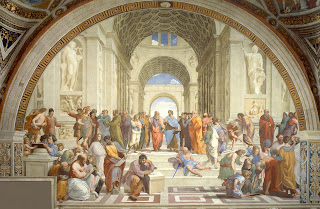 http://oil-paintingartist.com/other/murder_julian_cesar_b.jpg
http://oil-paintingartist.com/other/murder_julian_cesar_b.jpg“If then that friend demand why Brutus rose against Caesar, this is my answer: Not that I loved Caesar less, but that I loved Rome more.” (Act 3, Scene 2, Brutus lines 19-21) This quotation from the play, Julius Caesar written by William Shakespeare, shows that Brutus was lead to murder Caesar by his honor and patriotism. Brutus’ goal, which he did attain, was driven by his patriotism and honor. The murder of Caesar was an ambitious goal, but Brutus achieved it because of two factors that motivated him, honor and patriotism.
Brutus’ honor and patriotism have been mentioned throughout the play. These motivating factors of Brutus have caused him to join the conspiracy behind Caesar and stab Caesar to death. Brutus achieved his goal of murdering Caesar, but the outcomes were not as he had hoped. After Antony’s emotional speech, the Romans all turned against Brutus and a great battle began. Brutus achieved his goal because of falling into the trap set out by the conspirators. Their plan was to get Brutus on their side to “fix” the republic that would fall apart in the hands of Caesar. Brutus’ goal proved to be more noble than worthy. It was a noble act in the eyes of Brutus, but a tragedy in the eyes of the people.
Ideas and Content
In my essays my writing usually makes sense. I usually have a clear and focused topic also. I appear to know the topics somewhat, but should spend more time preparing for the final product. The details/evidence that I use are relevant, but not very interesting. This is something I can improve on. I usually explain how my quotes relate to the main idea, but I could find more interesting details to use in my essays.
Organization
In my writing my hook is present, but does not really grab the reader's attention. For example, in my Alchemist essay I start my introduction paragraph with a quote, but continue on with a sentence that is not very interesting. This is another aspect of writing that I should improve on. My thesis statement could be improved also. It does not really give the big idea of what my essay will be about. My body paragraphs have very short and uninteresting topic sentences. The topic sentence of my first body paragraph in my Julius Caesar essay demonstrates this. I need to establish the context of a quote before giving it in the future. I always explain the quote after giving the quote. My closing sentences serve as transitions, but could again be made more interesting to keep the reader interested. A conclusion is present in my writing, but is not very strong. This is another organizational piece that should be improved in my writing.
Personal Growth
I can see some improvement between my Alchemist essay and Julius Caesar essay. I see this improvement in my evidence given. My quotes are more significant in my Julius Caesar esssay than in the Alchemist essay which was written at the beginning of the year. However, my word choice has not really improved over the course of the year. This is a piece of writing that I hope I will improve on.
SLR Reflection
I thought creatively throughout the process of writing my essays. I had to think creatively when finding evidence that was both interesting and relevant to the topic. It was difficult for me to find the best quotes to use, especially with the Julius Caesar essay. I did not prepare enough for the final product, so my evidence was not the best. Thinking creatively is an important part of writing any essay.

 Peter, one of the
Peter, one of the 


